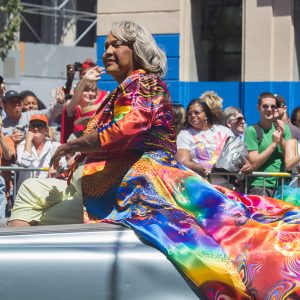calsfoundation@cals.org
Major Griffin-Gracy (1940s?–)
aka: Miss Major
Major Griffin-Gracy, or Miss Major as she is commonly known, is a transgender African American community organizer who has been an activist in groundbreaking LGBTQ+ movements since the 1960s. From Chicago, to New York, to San Francisco, and, finally, in Little Rock (Pulaski County), Miss Major has spent her life serving the LGBTQ+ community.
Miss Major was born in the 1940s, assigned male at birth, in the Chicago, Illinois, area. (In her biography, she states that she is unsure of what year she was born and that she doubts official records.) Her family was part of the Black middle class in Chicago’s South Side; her mother managed a beauty shop, and her father was a postal worker. After graduating early, she entered college in Milwaukee, Wisconsin, at the age of sixteen. She was quickly dismissed after a roommate discovered a suitcase of femme clothing among her belongings. After returning to Chicago around 1960, she stole a vehicle with a friend and attempted to flee. They were discovered speeding out of town, and she was arrested for the first time, spending six months incarcerated in a psychiatric facility, a common sentence for gender non-conforming people during the period.
After her release, she moved to New York City, where she became part of the underground Black and Latino drag and queer club scene known as Ballroom. During this period, she also engaged in sex work. She was arrested and jailed several times throughout the 1960s in New York. Because of the frequency of her arrests, she views the infamous raid at the Stonewall Inn in 1969, of which she is one of the few remaining survivors, as just another night during the period.
During a longer stint (circa 1970–1974) imprisoned in Dannemora, New York, Miss Major met and was influenced by Frank “Big Black” Smith, who shared his experiences organizing around Black liberation politics, community care, and abolition of the prison industrial complex; this relationship informed the rest of her life as a community organizer.
After her release, she returned to New York City, met Deborah Brown, and had a son, Christopher, in 1978. When their romantic relationship ended, Brown returned to New York City but continued to co-parent their son.
Miss Major’s release from prison coincided with the beginning of the HIV/AIDS epidemic. In New York and after moving to San Diego, California, around 1978, she worked to provide direct services to those affected by the disease. In the 1990s, she moved to the San Francisco Bay Area and worked with multiple HIV/AIDS organizations, including the City of Refuge in San Francisco and the Tenderloin AIDS Resource Center (TARC). During this time, she also operated the first needle-swap in the Bay Area to help prevent the spread of the disease.
In 2003, Miss Major joined the Transgender Gender-Variant & Intersex Justice Project (TGIJP), the only organization in the United States dedicated to assisting transgender people in prisons. She served as executive director from 2009 to 2015.
In 2015, after viewing a screening of MAJOR!, the 2015 documentary about her life, in Little Rock, she decided to move to the city, saying that she enjoyed the openness of the city and wanted to support trans Black women in Arkansas. She lives in Little Rock with her longtime partner Beck Witt Major, who identifies as a transgender man. Beck gave birth to their child Asiah in 2021. Miss Major maintains the operations of House of GG, also known as the Griffin-Gracy Educational and Historical Center. The center seeks to create safe, transformative spaces where transgender women of color can heal—physically, mentally, emotionally, and spiritually. The center also focuses on supporting the well-being and development of transgender community leaders in the South.
In May 2023, Verso Books published Miss Major Speaks: Conversations with a Black Trans Revolutionary, a memoir composed of interviews with Miss Major by journalist Toshio Meronek, her friend and former assistant.
For additional information:
Grear, Daniel. “Major Developments.” Arkansas Times, April 2023, pp. 27–29. Online at https://arktimes.com/rock-candy/2023/03/27/miss-major-griffin-gracy-a-black-trans-trailblazers-unlikely-path-to-little-rock (accessed March 1, 2024).
“Interview with Miss Major Griffin-Gracy.” New York City Trans Oral History Project, December 16, 2017, Manhattan, New York. https://nyctransoralhistory.org/interview/miss-major/ (accessed March 1, 2024).
Levin, Sam. “‘Get off our backs and let us live’: Miss Major Is Still Fighting for Trans Rights after 50 Years of Resistance.” Guardian, June 23, 2023. https://www.theguardian.com/us-news/2023/jun/22/miss-major-trans-activist-lgbtq-rights-interview (accessed March 1, 2024).
Meronek, Toshio, and Miss Major Griffin-Gracy. Miss Major Speaks: Conversations with a Black Trans Revolutionary. New York: Verso, 2023.
———. “‘Stonewall Never Happened’: Miss Major on the Broken Promise of Our Movement’s Most Famous Uprising.” them.com, May 11, 2023. https://www.them.us/story/miss-major-speaks-excerpt (accessed March 1, 2024).
Ophelia, Annalise, director. MAJOR! Documentary, Floating Ophelia Productions, 2015.
Danielle Afsordeh
CALS Butler Center for Arkansas Studies
 Civil Rights and Social Change
Civil Rights and Social Change Divergent Prosperity and the Arc of Reform, 1968–2022
Divergent Prosperity and the Arc of Reform, 1968–2022 Miss Major Griffin-Gracy at Pride
Miss Major Griffin-Gracy at Pride 



Comments
No comments on this entry yet.